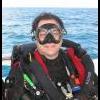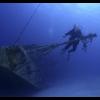(heaving a very big sigh of relief) Good to know!Yikes! What kind of dive requires this fast a descent?<snip> Keep in mind that some dives call for you to go into the water negative and descend like a rock. If that case, you may get stuck calling the dive if your ears didn't clear.< snip>
Also might be done if the boat has no intention of anchoring. You drop in, do your dive, shoot a bag, and wait for the boat to collect you. Don't worry, you probably won't be seeing one of these.. as Walter said, they are not common.
When that type of dive is attempted, most captains are usually very careful to make sure everyone on the dive is comfortable with the skills/concepts.
It all depends on the local conditions. These "hot" or "live" drops are fairly common around here especially on the deeper dives. The current moves so quickly and is so strong that the diver needs to hit the water and descend immediately upcurrent of the site. Otherwise, the current will pull the diver past the site.
Usually, the boat will drop a float ball on a line to the site, pull upcurrent, and then the divers jump in far enough upcurrent to start descending so that the they hit the descent line after being well on the way to the bottom. It minimizes the amount of time that the diver has to deal with current since it is typical, though not always so, that there will be less or even no current on the bottom. Scooters certainly make this much easier when carrying a lot of gear, and they can get the diver through the current zone quickly.

















